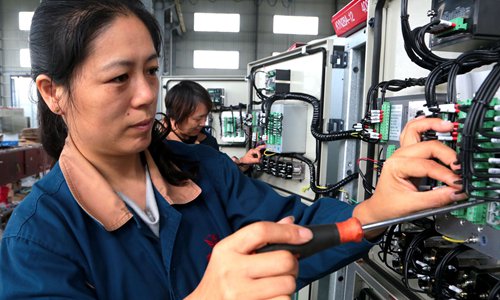Berlin should build competitiveness
Experts rebut German claim on unfair advantage

Workers manufacture mechanical equipment and electronic control equipment at a factory in Nantong, East China's Jiangsu Province on Thursday. The products will be exported to countries and regions along the routes of the Belt and Road Initiative including Russia, the Middle East and Western Europe. Photo: VCG
Germany should work on its core competitiveness instead of resorting to tightening trade regulations in the face of rising global competition, Chinese experts said on Wednesday, days after a German industrial body criticized China's subsidies and unfair competition.
In the paper - issued by Germany's Mechanical Engineering Industry Association (VDMA) on Monday - the association said that the current trade policy instruments of the EU and World Trade Organization (WTO) should be reviewed, and it indicated that China has an unfair advantage under WTO regulations as well as EU rules on public tenders.
"Subsidies for state and private companies in China distort production costs," the paper said, adding that "Chinese export subsidies influence international competition."
However, Chinese experts said that government support for strategic industries cannot be completely abandoned because China has a right to self-development.
"Europe has never abandoned subsidies to Airbus, and the US has never abandoned subsidies to Boeing. As long as a subsidy policy is consistent with international rules, no country should be restricted from developing its strategic industries," Yao Xi, a research fellow of the Chinese Academy of Social Sciences (CASS), told the Global Times.
In November 2019, a WTO panel found that the EU has sustained subsidies to Airbus, a finding that is at the center of a nearly 15-year dispute between the US and the EU, according to media reports.
Yao said that the protectionist note in the VDMA report and its tendency toward more restrictive regulations are not uncommon amid the turbulent global trade situation and the China-US trade war.
Several bids by Chinese companies have been subject to increasingly tighter regulations in Germany in recent years. In 2018, Chinese company Yantai Taihai's bid to take over the German toolmaker Leifeld Metal Spinning AG was blocked by the German cabinet, as officials continuously proposed to ramp up tightening efforts, media reported.
Behind Germany's increasingly protectionist stance is its plunging mechanical engineering sector and the fear of its Chinese counterparts. According to a report by Germany's Ministry of Economic Affairs, the output value of the mechanical manufacturing industry in 2019 probably fell about 2 percent compared with 2018. The actual figure hasn't yet been announced. The automobile industry, a key sector in Germany's manufacturing, has been mired in contraction.
By contrast, China's mechanical engineering sector has been growing exponentially. In 2019, the sector's exports reached 10 trillion yuan ($1.45 trillion), up 4.4 percent year-on-year, according to China's Ministry of Commerce. Of the total, exports of mechanical equipment rose 1.4 percent to 2.9 trillion yuan.
"The quality of Chinese machinery manufacturing is improving at rapid speed, while the price of German machinery manufacturing is too high because of high costs," Mao Risheng, a research fellow of the CASS, told the Global Times on Wednesday.
"Blaming each other won't solve the problem. The key is to improve core competitiveness," Mao added.
In effort to embrace economic globalization, China has been trying to further open up its market. The Foreign Investment Law, which took effect on January 1, is one of China's latest measures to create a level playing field for all enterprises.
"The Chinese government has always been committed to creating a level playing field for all enterprises, regardless of ownership or size," Liu Jianying, an associate research fellow at the Chinese Academy of International Trade and Economic Cooperation, said.